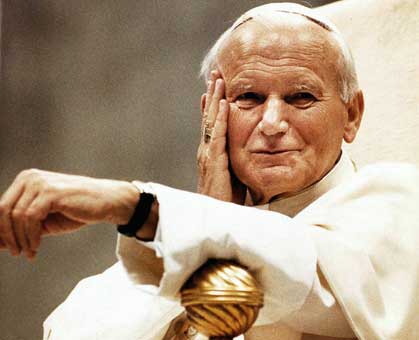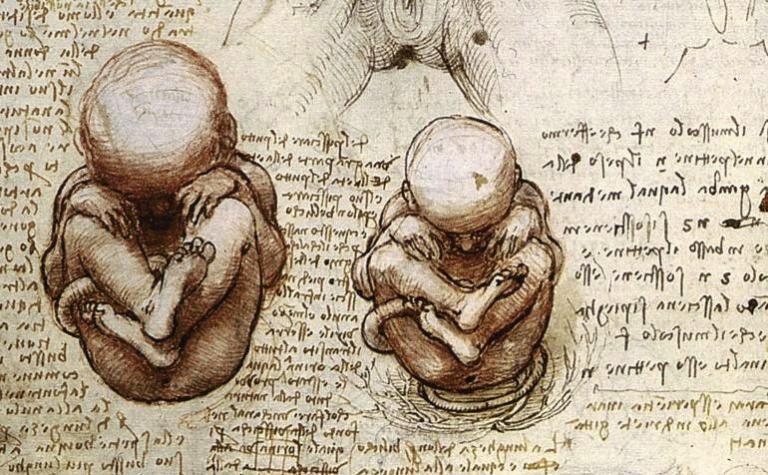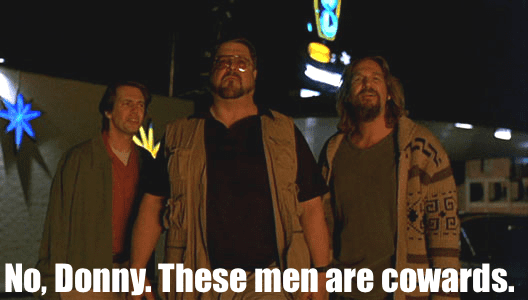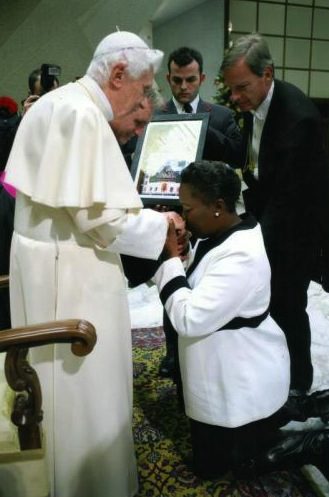
Jon O’Brien, el Presidento of that fantastic institution known as “Catholics For Choice” has made the equally fantastic claim that “Nobody Gets to Say Who Is and Who Is Not Catholic”. This is first and foremost odd, for if no one gets to say who is Catholic, then Jon certainly can’t name his institution “Catholic”. But he has, which means somebody — namely him — can say who is Catholic. (I do hope he — in his benevolent authority — will allow me to continue my use of the modifier.)
But Catholics for the Choice of Happily Making Choices Declared Bad Choices by Catholicism (previously known as The You Can Totally Be Something Without Being What That Something Is Clique) are no strangers to the oxymoronic. The last time we checked in with them they were expressing the massive support they receive from minority Catholics by purchasing stock photos of African-American couples — previously found on 80’s R&B compilation albums — for their Facebook ads. I suppose this wasn’t awkward enough, so now they’re writing to The Huffington Post all sad and oppressed-like about getting ruler-smacked by a nun. Cue O’Brien:
My organization, Catholics for Choice was the subject of a bizarre attack from the United States Conference of Catholic Bishops (USCCB) this week.
Inconceivable.
Sister Mary Ann Walsh, the director of media relations for the USCCB, took to her blog in a pathetic attempt to discredit CFC as a legitimate voice for Catholics in the United States. She expressed concern that “sleepy editors” or “inexperienced journalists” would be taken in by us, simply because we describe ourselves as Catholic. She said that we are not Catholics and we don’t know Catholicism. Walsh is sadly wrong on both counts. Any cursory visit to CFC’s website will give a reader the opportunity to learn more about Catholic teaching and church law about reproductive health than would a visit to many diocesan websites. And as to my Catholicism, perhaps I’ll send her copy of my baptismal certificate, though I doubt she’d be appeased.
This may be a difficult bit of logic, but I swear by all things holy, I’m close to having it tattooed on my chest: If a man claims communion with the Catholic Church — communion which requires the statement “I believe and profess all that the holy Catholic Church teaches, believes and proclaims to be revealed by God” in order to be obtained — and then proclaims the specific lack of belief in that which the Catholic Church teaches, believes and proclaims regarding human sexuality, then that man’s claim to communion is false.
Yes, a baptism is forever, and in that sense O’Brien is a Catholic. Communion with the Catholic Church is not necessarily forever. And the last time I checked, the abstract institution “Catholics For Choice” received no baptism, and has only dissented from Church teaching. Thus, however emotionally painful and “bizarre” it may be, the big, scary Sister is absolutely correct in saying that there is nothing “Catholic” about Catholics For Choice, though O’Brien insists on pretending she was questioning his personal baptism.
Her appeal to guarding the “brand” of Catholicism is simply crass. The Catholic church is not Apple or Google, global corporations that zealously police the use of their brand, siccing corporate lawyers on anybody who dares use their name in vain. The church’s brand control over individuals ends the minute a person is baptized.
Her control ends the minute some one is baptized? Is this real life? To be absolutely clear, this has all the implication that before some one is baptized the Church has brand control over them. In O’Brien’s alternative universe:
“I’m a Hindu.”
“Sorry, no, you’re a Catholic. You haven’t been baptized, see, and thus we have brand control over you.”
“Oh, word? I’ll just convert then. I’m a Catholic.”
“We can neither confirm nor deny this.”
“Really?”
“Yeah, sorry. The [C]hurch’s brand control over individuals ends the minute a person is baptized.”
“Oh. Wow, I feel dumb. Where in the Catechism is that?”
“The what?”
I’m sure O’Brien had no intention of saying this, or perhaps he operates on a deeper level than myself, so we’ll forgive him and move onwards:
From that point forward, we have the right — and the responsibility — to speak as Catholics on matters of social justice, including those that involve sex, sexuality and reproduction. Understandably, this makes Walsh and her bosses nervous because all too often, the bishops haven’t said or done the right thing on these issues.
The “right thing” being what the arbiter of the Catholic faith — Jon O’Brien — believes to be the right thing, namely the acceptance and toleration of human beings being killed in utero.
We base our support for access to reproductive health services on the long-standing traditions within Catholicism.
Therefore, by the authority which Christ conferred upon Peter and his Successors, in communion with the Bishops — who on various occasions have condemned abortion and who in the aforementioned consultation, albeit dispersed throughout the world, have shown unanimous agreement concerning this doctrine — I declare that direct abortion, that is, abortion willed as an end or as a means, always constitutes a grave moral disorder, since it is the deliberate killing of an innocent human being. This doctrine is based upon the natural law and upon the written Word of God, is transmitted by the Church’s Tradition and taught by the ordinary and universal Magisterium. (Evangelium Vitae 62)
At least the Church is clear on what she believes, a thing that can not be side of CFC. O’Brien, entirely petrified of saying that he supports abortion and contraception, insists on giving us all the “reproductive health services” nudge-and-wink, as if the Catholic Church radically opposes gynecology and functioning ovaries.
We are part of the great majority who believe that the teaching on the primacy of conscience means that every individual must follow his or her own conscience — and respect the rights of others to do the same. As Catholics we take seriously our obligations to know and thoughtfully consider Catholic teaching.
But O’Brien, you’ve got it all mixed up! Primacy belongs to conscience, yes, and conscience — if it is a well-formed, which it has the obligation to be — faithfully follows the Magisterium of the Church. Let’s look, ever so briefly, at what the Church actually teaches:
From the Catechism, paragraph 2039: “Personal conscience and reason should not be set in opposition to the moral law or the Magisterium of the Church.” So right there, you’ve got an issue.
Why? Because, as Vatican II put it, “By this appreciation of the faith, aroused and sustained by the Spirit of truth, the People of God, guided by the sacred teaching authority (Magisterium), and obeying it, receives not the mere word of men, but truly the word of God (cf. 1 Th. 2:13)…The People unfailingly adheres to this faith, penetrates it more deeply with right judgment, and applies it more fully in daily life.”
This “sacred teaching authority” is entrusted to the bishops, and it is you and I — if we are to follow our conscience — who must be guided by it. We don’t simply note the Magisterium, as one turns his nose at the broccoli in the cafeteria line. We follow it, for it is not a human word, but “the word of God”.
Again, as the Second Vatican Council put it: “Bishops who teach in communion with the Roman Pontiff are to be revered by all as witnesses of divine and Catholic truth; the faithful, for their part, are obliged to submit to their bishops’ decision, made in the name of Christ, in matters of faith and morals, and to adhere to it with a ready and respectful allegiance of mind.”
At what point amidst all this readily available Church teaching did the kids over at Catholics For Choice decide dissent was a-ok? What about the bishops’ decision that “direct abortion, that is, abortion willed as an end or as a means, always constitutes a grave moral disorder, since it is the deliberate killing of an innocent human being” are you letting guide your conscience?
And in coming to our positions on abortion, family planning and other issues we have done so, and continue to do so. We didn’t make this up. We’ve got saints, cardinals, theologians and millions of Catholics on our side.
Saints that support abortion?
As somebody intimately familiar with the ways of the church, Sister Mary Ann knows that nobody gets to say who is and who is not Catholic. Not the priests, not the bishops and not the pope. One is a Catholic after baptism. Period. She might have her own opinions about who is a good Catholic or a bad Catholic, but her claims that we aren’t Catholic needs some fact-checking.
O’Brien makes the mistake of not reading Sister Mary Ann’s critique of his organization. She says, quite rightly, that “some agenda groups who oppose one or more Catholic teachings, for example, use the name “Catholic,” even when there seems little evidence of Catholics in their ranks and no evidence that they represent Catholic teaching.” She never questions O’Brien’s right to call himself a Catholic. He certainly may, in the sense that Martin Luther — or any heretic — may call himself baptized Catholic. She questions Catholics For Choice — the institution — being labeled as “Catholic”, a question O’Brien oh-so-cunningly does not address.
The good sister may be jealous of the media attention we get. She may be upset at the quality of our arguments. She may find the statistics that we use disconcerting. I would, if I were her, as they show that the positions taken by the bishops have been resoundingly rejected by Catholics in the pews. But it’s interesting that she chose not to, or more likely couldn’t, address the basis of our arguments. So she resorts to demonizing us.
Sister Mary Ann’s rant was addressed to the new public editor at the New York Times, Margaret Sullivan. It seems that she thinks that a senior editor at the Times will be intimidated into ignoring the legitimate and widely supported arguments of those who are not granted the bishops’ blessing. We know that we speak for the majority in the church. And we are happy to continue to forge our path, knowing that it is one that will be well-traveled by our fellow Catholics for choice.
As to Ms. Sullivan, and her many fine colleagues in the Fourth Estate, I am pretty sure they know that if they want the U.S. bishops’ opinion on something, they can give Sister Mary Ann a call. But when they want to know what Catholics think, they know to call somebody else. CFC will always be happy to take that call.
And so we come to the end of another adventure in self-congratulation. The value of Catholics For Choice comes entirely from the fact that the media can use them to spin stories on the Catholic Church, and that the majority of uncatechized Catholics agree with their claims. This, apparently, is popularity enough to revel in. They have accidence without substance, fad without truth, and popularity of opinion without the ability to back up their “Catholic” claim with Church documents. They’re cool in the way Nickleback is cool: More people listen to them than listen to Johnny Cash, but they’re still full of crap.
Pray for their conversion, and an end to the injustice of abortion.













